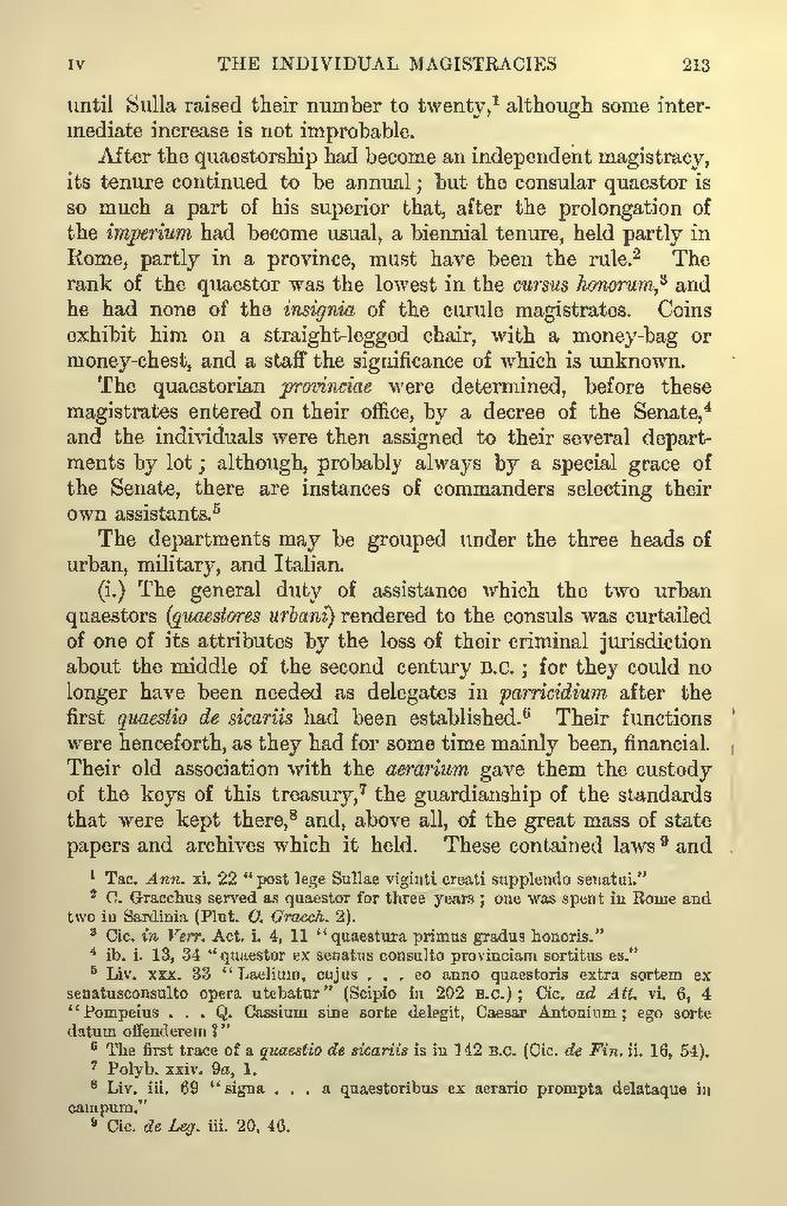until Sulla raised their number to twenty,[1] although some intermediate increase is not improbable.
After the quaestorship had become an independent magistracy, its tenure continued to be annual; but the consular quaestor is so much a part of his superior that, after the prolongation of the imperium had become usual, a biennial tenure, held partly in Rome, partly in a province, must have been the rule.[2] The rank of the quaestor was the lowest in the cursus honorum,[3] and he had none of the insignia of the curule magistrates. Coins exhibit him on a straight-legged chair, with a money-bag or money-chest, and a staff the significance of which is unknown.
The quaestorian provinciae were determined, before these magistrates entered on their office, by a decree of the Senate,[4] and the individuals were then assigned to their several departments by lot; although, probably always by a special grace of the Senate, there are instances of commanders selecting their own assistants.[5]
The departments may be grouped under the three heads of urban, military, and Italian.
(i.) The general duty of assistance which the two urban quaestors (quaestores urbani) rendered to the consuls was curtailed of one of its attributes by the loss of their criminal jurisdiction about the middle of the second century B.C.; for they could no longer have been needed as delegates in parricidium after the first quaestio de sicariis had been established.[6] Their functions were henceforth, as they had for some time mainly been, financial. Their old association with the aerarium gave them the custody of the keys of this treasury,[7] the guardianship of the standards that were kept there,[8] and, above all, of the great mass of state papers and archives which it held. These contained laws[9] and
- ↑ Tac. Ann. xi. 22 "post lege Sullae viginti creati supplendo senatui."
- ↑ C. Gracchus served as quaestor for three years; one was spent in Rome and two in Sardinia (Plut. C. Gracch. 2).
- ↑ Cic. in Verr. Act. i. 4, 11 "quaestura primus gradus honoris."
- ↑ ib. i. 13, 34 "quaestor ex senatus consulto provinciam sortitus es."
- ↑ Liv. xxx. 33 "Laelium, cujus . . . eo anno quaestoris extra sortem ex senatusconsulto opera utebatur" (Scipio in 202 B.C.); Cic. ad Att. vi. 6, 4 "Pompeius . . . Q. Cassium sine sorte delegit, Caesar Antonium; ego sorte datum offenderem?"
- ↑ The first trace of a quaestio de sicariis is in 142 B.C. (Cic. de Fin. ii. 16, 54).
- ↑ Polyb. xxiv. 9a, 1.
- ↑ Liv. iii. 69 "signa . . . a quaestoribus ex aerario prompta delataque in campum."
- ↑ Cic. de Leg. iii. 20, 46.
